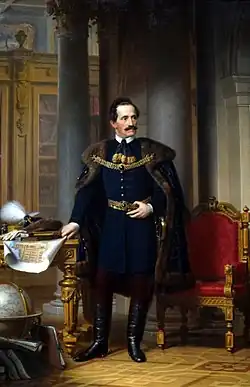1848 Hungarian parliamentary election
| |||||||||||||
All 377 seats in the Diet 189 seats needed for a majority | |||||||||||||
|---|---|---|---|---|---|---|---|---|---|---|---|---|---|
| |||||||||||||
King Ferdinand V ratified the so-called April Laws on April 11 in 1848. He closed the last Diet of the Estates and opened the first modern Parliament. The first government led by Count Lajos Batthyány, who the leader of the OP. Article IV of 1848 moved the seat of the parliament from Bratislava to Pest.
The new law significantly expanded suffrage. It granted active suffrage to all men over the age of 20 with no criminal record, who were born in the Kingdom or naturalized, were not under guardianship or landlord authority, belonged to a legally recognized religious denomination (Roman Catholic, Calvinist, Lutheran or Orthodox), and possessed certain property.
With the above rules approximately 1/8 of the country's adult population could had exercise the right to elect representatives, but the turnout is unknown. The parliament was convened for July 2, but the ceremonial opening was set for July 5. From the 446 representatives 377 elected in Hungary and 69 in Transylvania.
72% of the mandates were elected by landowner nobility and 25% by urban citizens and the remaining 3% shared between the clergy, intellectuals and peasants.[1]
Results
The Prime Minister and four ministers elected as Representative. The 96 Transylvanian representatives did not join to the Parliament, because of the Hungarian Revolution of 1848. The correct number of the gained seats by parties are unknown.

